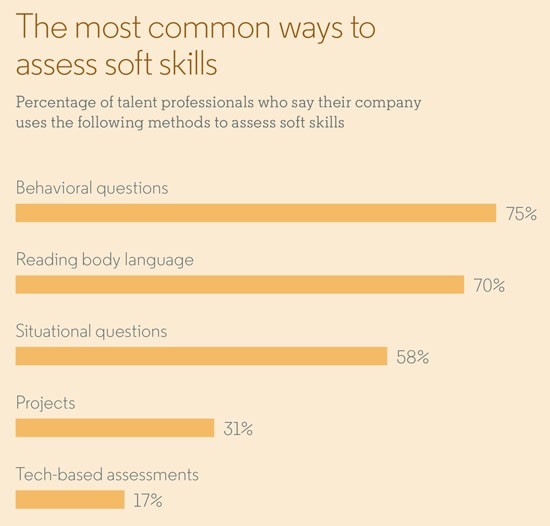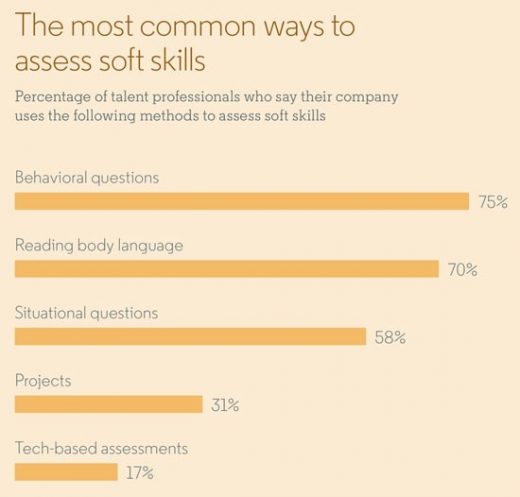Manager Essentials: Interviewing For Soft Skills
— August 6, 2019
Most managers know technical knowledge and experience are important to job performance, but those factors alone are not enough to assess a candidate. People who know the right thing to do in difficult situations or have innovative ideas can’t be successful if they can’t communicate clearly, effectively resolve differences, or inspire and motivate others to go the extra mile. Without these “soft skills,” it’s unlikely even the smartest and most experienced person will get much done.
The problem is that soft skills are difficult to identify on a resume or in an interview. Two simple, practical steps can help a manager more accurately identify candidates who are a good cultural fit and have the leadership skills required for success.

1. Identify Critical Competencies
While it may sound like an obvious step, organizations often stumble into the hiring process without a clear idea of the most important skills for a particular role , which in turn leads to hires who might possess impressive technical skills but wind up struggling because they lack other important skills or characteristics.
Leadership competency models not only identify the core competencies a candidate should possess, but also align those skills with the company’s greater strategic goals. While technical competencies are important, leadership positions require soft skills that allow leaders to be resilient and agile. If candidates have never demonstrated these competencies or lack the potential to develop them, they will likely struggle to manage their teams effectively.
Competency models should be incorporated into the overall assessment process. In addition to shaping interview questions, they can also be applied to other assessment tools, such as personality tests or simulations. These tools reveal traits and behaviors that are not apparent during an interview. While no one assessment method should be considered the sole determinant of whether or not to hire a candidate, they can be combined to create a more comprehensive picture of a candidate’s fit for a position.
2. Use a Robust Interview Processes
It may be surprising to know that many interviewers use a process that is unlikely to produce much useful information.
The unstructured interview is a casual, loosely organized interview. No attempt is made to define the job/personal dimensions. The interviewer’s tactics are decided on the spur of the moment. The outcome of the interview is so unpredictable that tossing a coin can sometimes work as well. This process is best used to identify the cultural compatibility of a candidate.
The highly structured interview is one in which the interviewer has a list of specific questions to ask in a prescribed order of all candidates. This often provides little more information than can be obtained with a printed questionnaire. Interviewing with this technique can provide insight into a candidate’s technical knowledge or professional background, but little else.
The systematic interview, a combination of unstructured and structured interviews, has two essential characteristics: systematic planning and a proficient interviewer. The systematic interview incorporates the flexibility of the unstructured interview with the preparation and consistency of the structured interview to yield the best results. This approach has the potential to provide much more useful information about the candidate.
3. Ask Three Types of Questions
The purpose of interview questions is to test assumptions that you have formed about the applicant’s ability to perform the job successfully, based on his or her application and resume. There are three basic types of interview questions.
Informational Questions
These questions are designed to seek information from the applicant. For example:
- “How much travel are you willing to do for this job?”
- “What was the most helpful interpersonal skill you learned in your last job/in school?”
- “Why are you interested in this position?”
Behavioral Questions
Behavioral questions ask for examples of past behavior in specific situations:
- “Tell me about a time when you needed to juggle multiple priorities. How did you handle it?”
- “Give me an example of a difficult customer situation you handled successfully.”
- “Tell me about a time when you managed a complex project—how did you bring people together as a team?”
Situational Questions
These questions pose hypothetical situations and ask the applicant how he or she would respond:
- “Suppose you woke up late and would not be able to make it to work on time. How would you handle this situation?”
- “If you are approached by a coworker who has the intention of conducting personal business on company time, how would you conduct yourself?”
- “The company has ordered a surplus of ‘swag’ (i.e. pens, notebooks, etc.) You realize that you are low on supplies at your home office. Would you take some of the excess office supplies for personal use?”
Asking the candidate questions is only one part of the interview process. If possible, hiring managers should conduct interviews with the candidate’s references to gain a more comprehensive picture of their work experience, performance, and potential.
4. Key Principles of Interviewing for Soft Skills
Although there are many dynamics that increase the complexity and variability of the interview process, there are three key principles that can serve as a guide. These principles are particularly helpful in preparing questions for interviews and to guide your follow-up after the interview:
Past behavior is the best predictor of future behavior.
Research shows that people act consistently over time. For example, a person who has had little patience dealing with customers in the past is likely to have little patience dealing with customers in the future.
Count on the consistency of behavior.
Research also shows that people will act consistently across situations. For example, people whose résumés have typographical errors, or who are late for the interview, are likely to have the same kind of issues on the job.
It is easier to predict failure than success.
Because there are many variables that can contribute to a person’s success on the job, it is easier to predict if a person will fail by identifying a deficiency in a competency necessary to perform the job.
Using a systematic interview process and asking a variety of robust questions can increase your ability to consistently select the people who are a good fit with the job requirements and the company culture. It helps ensure the focus of the interview is on the qualities that are critical for success and enhance your ability to identify these qualities during the interview. Ensuring your company has a strong pipeline of future leaders starts with hiring the right people.
Business & Finance Articles on Business 2 Community
(87)


